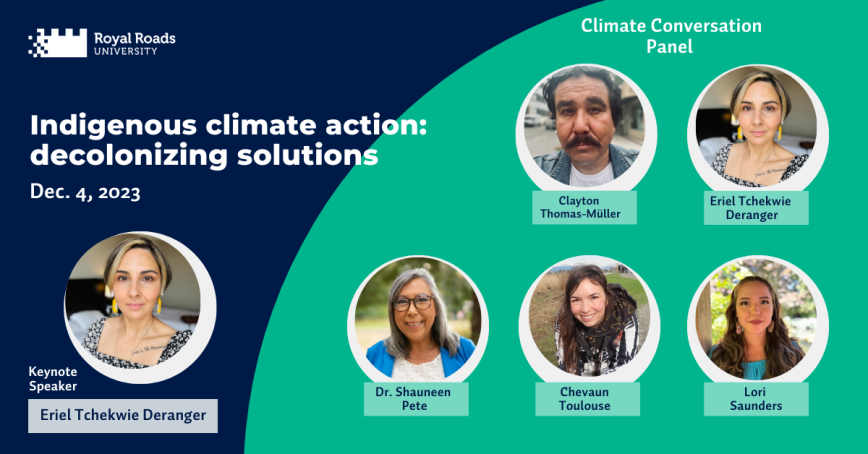Share online

Virtual event
Online
Indigenous Climate Action: Decolonizing Solutions
Join us for a keynote and storytelling circle exploring the intersections of Indigenous rights and knowledge, climate justice, and decolonization. From international climate negotiations to frontline communities, Indigenous leaders are motivating people to activate climate solutions in a new way. Through stories and perspectives shared by these incredible leaders, the audience will find hope in the power of relationships and Indigenous-led climate movements.
This free, online session is open to all who are interested.
Keynote Speaker: Eriel Tchekwie Deranger of Indigenous Climate Action
Storytelling Circle: Eriel Tchekwie Deranger, Clayton Thomas-Müller, and RRU Indigenous Environmental Pathways Program* graduates Lori Saunders and Chevaun Toulouse in a discussion to facilitated by Dr. Shauneen Pete.
*RRU offers the Indigenous Environmental Leadership Pathways Program and the Graduate Certificate in Science and Policy of Climate Change in partnership with ECO Canada.
Interested in attending?
About the Panelists:
Eriel Tchekwie Deranger
Eriel is a Dënesųłiné mother from the Athabasca Chipewyan First Nation (ACFN) and the Executive Director and co-founder of Indigenous Climate Action, an Indigenous-led climate justice organization in so-called Canada. Deranger is a member of the International Indigenous Peoples Forum on Climate Change, and sits on various boards including Bioneers, It Takes Roots Leadership Council, Climate Justice Resiliency Fund Council of Advisors, and WWF Canada; and was a founding member of the Global Indigenous Youth Caucus. Deranger’s work focuses on Indigenous rights and building intersectional dialogue between Indigenous rights, climate justice and other social justice movements. She is recognized for her role as the spokespersons for her community (ACFN) in the international Indigenous Tar Sands Campaign and developing the Tar Sands Healing Walk.
Clayton Thomas-Müller
Clayton is a member of the Treaty #6 based Mathias Colomb Cree Nation also known as Pukatawagan located in Northern Manitoba, Canada. Based in Winnipeg. He has been recognized by Yes Magazine as a Climate Hero and is featured as one of ten international human rights defenders in the National Canadian Museum for Human Rights. He has campaigned across Canada, Alaska and the lower 48 states organizing in hundreds of First Nations, Alaska Native and Native American communities to support Indigenous Peoples to defend their territories against the encroachment of the fossil fuel industry with a special focus on stopping the expansion of the Canadian tar sands and its associated pipelines. Clayton is an award winning film director, media producer, organizer, facilitator, public speaker and bestselling author on Indigenous rights and environmental & economic justice. His book, Life in the City of Dirty Water, was a national bestseller and a CBC Canada Reads finalist.
Lori Saunders
Lori, Ximximuslayc, is Sutslmc and Tsilhqot’in from the territories Kimsquit and Xeni Gwet’in. Lori is the Clean Energy Coordinator for Xeni Gwet’in First Nations Government; She is a member of the Climate Action Network for Coastal First Nations and Great Bear Initiative. Lori is also an Advisor for Indigenous Priorities, Vancouver Foundation.
Lori has completed the Indigenous Environmental Leadership Pathways Program at Royal Roads University and the Business Administration Program with Smith University and Queen's University. She also completed the Project Management Program with UBC Sauder School of Business and has participated in the Global Youth Climate Training and Canada World Youth Program.
Chevaun Toulouse
Chevaun is a mother, graduate of RRU's Indigenous Environmental Leadership Pathways Program, and a full-time biology and Indigenous environmental science student at Trent University. From an early age, Toulouse has been out on the land observing all creatures and is keen on staying in her community upon graduation. Chevaun plans on bringing her learned knowledge back into her community and all of Ontario to conserve, protect and educate others on land and water stewardship.
Chevaun worked for the Magnetawan First Nation Lands, Resources and Environment Department as the Lead Species at Risk Field Technician and Cultural Coordinator and recently held the position of researcher for an incredible TV series just released called Great Lakes Untamed. Bringing an Indigenous scientific perspective to this project was important to her while also highlighting the current environmental struggles our Great Lakes face.
Dr. Shauneen Pete (moderator and Chair, Emerging Indigenous Scholars Circle at RRU)
Shauneen Pete is a mother, grandmother, educator, and storyteller from Little Pine First Nation (Treaty 6 territory) under the (patriarchal and colonial) Indian Act system, with family in Cowessess First Nation (Treaty 4 territory) on her maternal side.
Dr. Pete is an urban Indigenous person who grew up in Regina and Saskatoon and graduated from the Indian Teacher Education Program at University of Saskatchewan and earned a PhD in Higher Education Administration from the University of Arizona. Her areas of specialization include the decolonization and Indigenization of Canadian higher education, reconciliation education and anti-oppression. She has recently co-authored the book Decolonizing Educational Relationships which will be available in Dec. 2023.
Dr. Pete served as both the Vice-President Academic and interim President at First Nation University of Canada. She was the Executive Lead of Indigenization at the University of Regina, and the Indigenous Resurgence Coordinator at University of Victoria. Dr. Pete joined Royal Roads in 2022 and is the Chair of the Emerging Indigenous Scholars Circle.